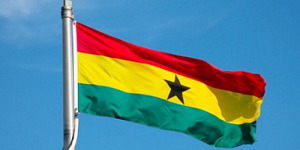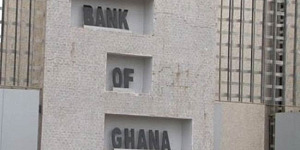Ghana's central bank left its monetary policy rate unchanged at 16.0 percent, saying the recent pass-through of a lower exchange rate had slowed the process of disinflation, but core inflation remains subdued and inflation expectations are anchored.
The Bank of Ghana (BOG) also said the moderation in global economic growth and an easing of global financing conditions means global interest rates are likely to remain broadly steady, which has reduced the risk of sudden portfolio reversals out of emerging and frontier markets if investor sentiment were to shift in response to deepening trade, geopolitical tensions or a sharper than expected slowdown in global growth.
BOG, which cut its rate 100 basis points in January as it extended a monetary easing cycle that began in November 2016, added it was ready to take appropriate measures to maintain price stability.
Ghana's headline inflation rate has accelerated in the last 4 months to 9.5 percent in April from 9.0 percent in January due to the impact of the decline in the cedi, but BOG said this rise did not appear to have become embedded in underlying inflation as its measure of core inflation, which excludes fuel and utilities, declined in April and inflation expectations remain anchored.
Ghana's foreign exchange market has calmed down since a bout of volatility in February and March when many emerging market economies were hit. The rebound of the cedi in late March was due to its supportive fundamentals along with improved supply of foreign exchange following the Eurobond issue.
The cedi has been depreciating against the U.S. dollar since 2010 and so far this year the exchange rate is down 6.7 percent to 5.22 per U.S. dollar. In trade-weighted terms, BOG said the real effective exchange rate was broadly aligned with underlying fundamentals.
Economic activity in Ghana slowed last year but remains relatively strong as gross domestic product in the fourth quarter grew 6.8 percent, down from 7.4 percent in the third quarter, for full-year growth of 6.3 percent, down from 8.1 percent in 2017.
BOG added its latest composite index of economic activity showed evidence of increased activity with annual growth of 4.0 percent in March, up from 2.9 percent a year earlier, with sentiment supported by the cedi's recovery from a recent fall in March, followed by a rebound, and favorable growth prospects even though consumer sentiment weakened slightly due to higher prices.
Ghana's gross international reserves rose to US$9.9 billion, equivalent to 5.1 months of import cover, at the end of March from $7.0 billion end-December. By the end of April reserves had declined to $9.3 billion due to energy-related payments and payments of externally held domestic debt.























































